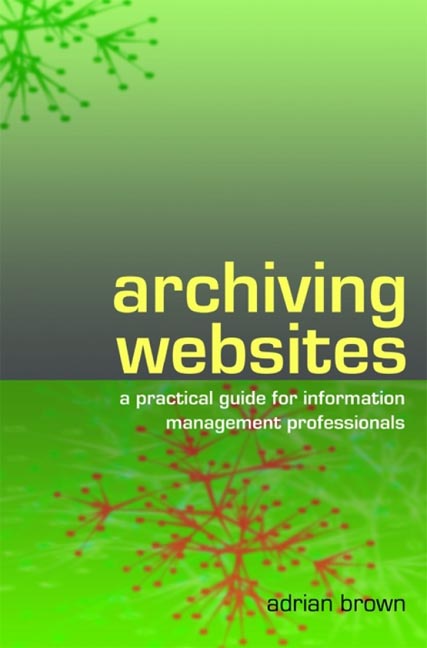Book contents
- Frontmatter
- Contents
- Acknowledgements
- Glossary
- 1 Introduction
- 2 The development of web archiving
- 3 Selection
- 4 Collection methods
- 5 Quality assurance and cataloguing
- 6 Preservation
- 7 Delivery to users
- 8 Legal issues
- 9 Managing a web archiving programme
- 10 Future trends
- Appendix 1 Web archiving and preservation tools
- Appendix 2 Model permissions form
- Appendix 3 Model test script
- Appendix 4 Model issues log
- Appendix 5 Model job description
- Bibliography
- Index
- Digital Preservation
- Frontmatter
- Contents
- Acknowledgements
- Glossary
- 1 Introduction
- 2 The development of web archiving
- 3 Selection
- 4 Collection methods
- 5 Quality assurance and cataloguing
- 6 Preservation
- 7 Delivery to users
- 8 Legal issues
- 9 Managing a web archiving programme
- 10 Future trends
- Appendix 1 Web archiving and preservation tools
- Appendix 2 Model permissions form
- Appendix 3 Model test script
- Appendix 4 Model issues log
- Appendix 5 Model job description
- Bibliography
- Index
- Digital Preservation
Summary
Introduction
The initiation of any web archiving programme is self-evidently based on a decision to collect, which in turn implies the application of an explicit or implicit process of selection. The development of an appropriate selection policy is therefore an essential precursor to the implementation of any such programme. The nature of a given selection policy will be determined by a number of factors, including the remit and mission of the collecting organization, intellectual property rights issues and the institutional resources available. Web archiving programmes may be implemented by a wide variety of institutions, including libraries, archives, museums, research organizations, learned societies and commercial organizations, which may collect web resources for many diverse reasons, such as for their intellectual, evidential or artefactual qualities. Web archiving can therefore encompass many different curatorial traditions and approaches to selection.
It might appear that, within such well-established curatorial traditions, the development of selection policies for websites would pose no significant new issues, and it is certainly not the purpose of this chapter to discuss the general principles of appraisal and selection. However, the very nature of the world wide web challenges these traditions, and must be taken into account. These challenges arise from the structural, temporal and informational qualities of the web.
One of the principal defining qualities of the web is its interconnectedness. Every website has the potential to link to and be linked to from any number of other websites. It may also derive a greater or lesser part of its content from external sources, such as Really Simple Syndication (RSS) feeds. Indeed it is often difficult, if not impossible, to define any given website in terms of absolute boundaries. The facility to create, copy and link to information content with great rapidity renders obsolete the paper paradigm of discrete, enumerable and physically locatable information objects. It may in fact be more helpful to regard a website as a conceptual grouping of information experienced by a user, rather than as an artefact with any coherent physical existence. Furthermore, no website can be considered as an isolated object – it exists within a wider context which, ultimately, extends to encompass the entire world wide web. The breadth and complexity of that context is further complicated by its frequent opacity, whereby the relationships between resources may not be easily apparent.
- Type
- Chapter
- Information
- Archiving Websitesa practical guide for information management professionals, pp. 24 - 41Publisher: FacetPrint publication year: 2006



